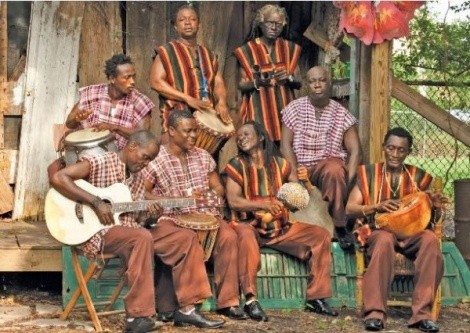
The Living Traditions festival is all about celebrating the diversity of Salt Lake City, and while the artwork and food endemic to the event offer appealing ways to explore the city’s ethnic communities, nothing brings our various cultural strands together quite the way music does.
On any given night during Living Traditions, you can find yourself in awe of a musician on stage, joined in a communal experience with people from across the globe.
This year in particular—the 25th for Living Traditions— the music headliners offer a cultural smorgasbord of sound, from the Celtic-folk of Solas to the Mexican dance-rock of Nortec Collective to the African-American string band Carolina Chocolate Drops to the West African rhythms of Sierra Leone’s Refugee All Stars.
“We’re always looking for traditional stuff, and it’s more difficult than people think,” says festival director Casey Jarman. “Even if you’re looking at Irish music, or the music of Sierra Leone, it tends to morph a little bit away from the real traditional stuff.”
That is certainly the case with Sierra Leone’s Refugee All Stars, and the evolution of the band’s sound was borne of the horrific circumstances of its formation as well as the uplifting story of the group’s recent global success.
As Sierra Leone was ravaged by civil war through the ’90s, millions gathered in refugee camps along the country’s border with Guinea. It was in one of those camps that Reuben Koroma put out a call to find fellow musicians and set out to entertain the masses gathered in the camps.
The music Koroma’s band created didn’t sound like a West African version of the blues, but a joyous explosion of uplifting rhythms and lyrics.
“The idea is, when people find themselves in a situation that is sorrowful, you don’t need to create something that will make them feel more sorrowful,” Koroma says. “Create something that will make them have some fun. Take them out of that situation and bring them to a happy situation. When we were trying to write songs to play for them, we tried to find rhythms that will make them dance, will make them feel happy.
“That’s how we found out the music is good therapy for people who have psychological problems. When we first tried it, it was for ourselves,” Koroma says. “We had lost everything. We lost family members. But instead of thinking about what happened to us, we played so we can sing to forget what happened to us. And when we did it, our lives were reformed.”
Some American filmmakers followed the band as it played in different refugee camps, and the resulting documentary gave Sierra Leone’s Refugee All Stars their name, and global attention. They landed a record deal and ending up touring the globe supporting that self-titled debut, even appearing on Oprah.
The band recorded its new album, Rise & Shine, in New Orleans, and found themselves feeling right at home in the Big Easy. Not only was the food similar to what they’d eat at home, Koroma says, but “New Orleans suffered through the destruction of Hurricane Katrina, and you can see the ruins. Likewise, in Sierra Leone, it’s been devastated by the civil war, and we have ruins there, too. They look alike.”
Koroma and Co. also took advantage of the New Orleans nightlife and its brilliant music community; many New Orleans players found themselves contributing to Sierra Leone’s Refugee All Stars’ new album.
Now the band is on the road, and remains amazed that music they made to ease the burden of their neighbors in West Africa can connect with Americans.
“The objective behind our music is to help reform refugee lives,” Koroma says. “I was surprised the American audiences could develop interest in listening to our lyrics. It’s really a surprise to me. Sometimes after we play, I try to ask people their reaction, and people tell me the lyrics to our songs really touch their mind. It makes me feel very proud.”
LIVING TRADITIONS
Salt Lake City & County Building
451 S. State
Friday, May 21 through Sunday, May 23
Free
SIERRA LEONE'S REFUGEE ALL STARS
Saturday, May 22
7 p.m.
SLCGov.com/Arts/LivingTraditions